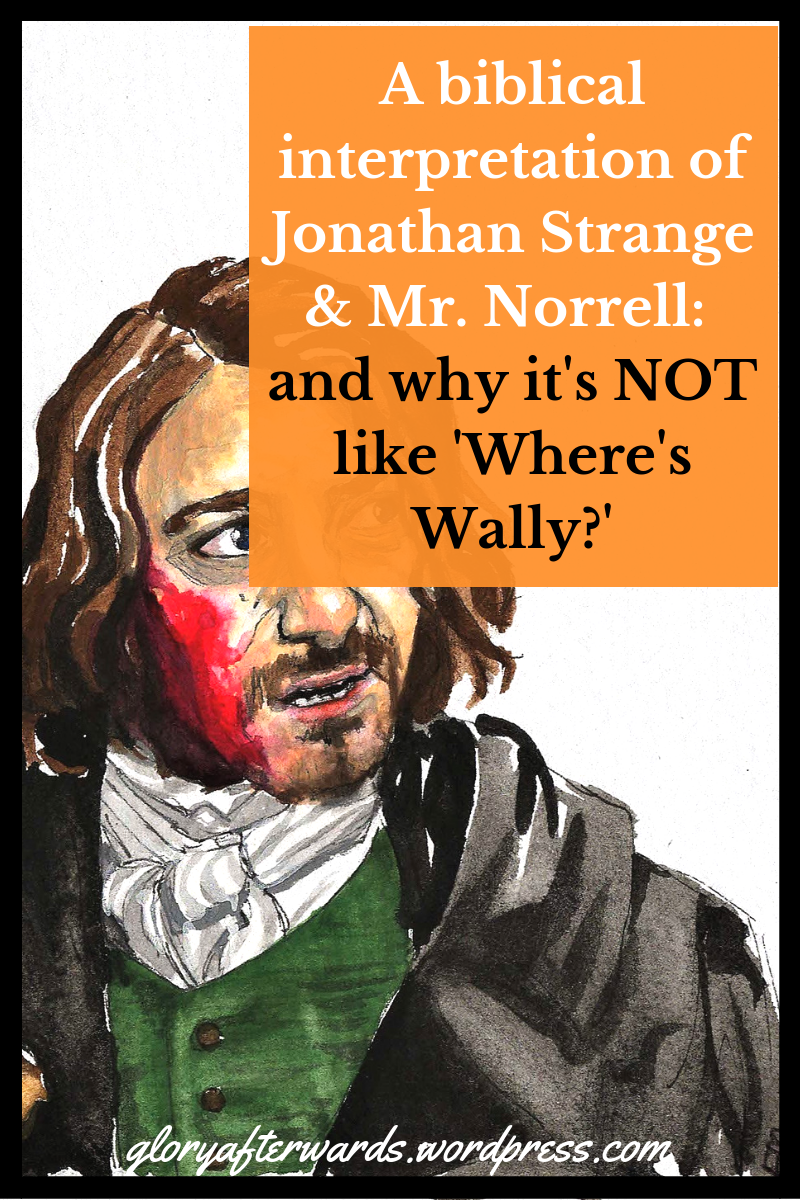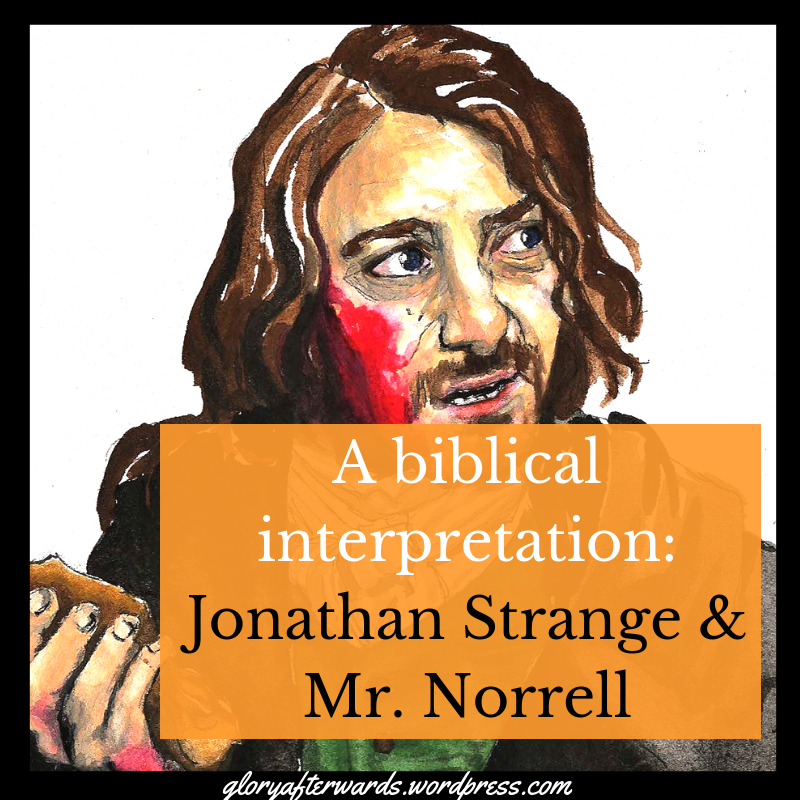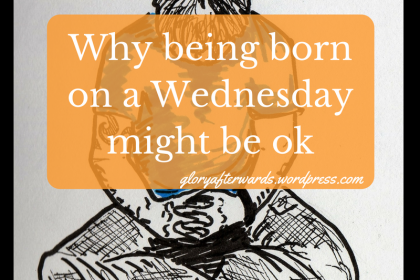I wrote a review of sorts for the BBC series Jonathan Strange and Mr. Norrell, but it occurs to me that I have neglected to write about book by Susanna Clarke of the same name.
There are multiple book reviews for this 800 page novel on the web. Some brilliant, some dry, some which encapsulate what I believe to be the heart of the book and others which appear to miss it altogether.
There are also many critical interpretations: I’ve read essays which address social class, feminism, LGBT representation, historicism, religion, textual structure, folklore and nationalism.
I haven’t seen a Biblical interpretation (although I saw an interesting gnosticism one) and so I’d like to attempt that here. I feel, however, that I ought to state some disclaimers:
- By analyzing JSMN from a biblical perspective, I’m not claiming that this is how Clarke constructed the text. I am simply doing what literary critics do and reading it with a specific framework in mind.
- I’m also not claiming that ‘the Author is dead,’ and Clarke’s intentions don’t matter. I think that such a reading devalues the text. Nevertheless, the reader has a right to interpret to the extent that they can back their arguments with textual examples.
- By reading JSMN through a biblical framework, I’m not claiming it’s an allegory. There seems to be the mistaken idea that reading something “with a Christian perspective” simply involves finding a Christ-like figure and pinpointing a resurrection – as if textual interpretation is some sort of bizarre Where’s Wally? Game. It’s so much more than that.
There are many elements of JSMN which coincide and complement the Biblical historical narrative. I have laid out some of these in the table below, followed by a more general discussion and concluding with some practical implications for Christian thought.
Comparisons
|
Biblical |
JSMN |
| Israel has been subsumed by Rome. They are without king, but live in the wake of the golden age of king David and Solomon. | Northern England is ruled by the Southern king, because magic & the Raven King have been missing for 300 years. They live in the wake of the golden age of Magic. |
| Much of the worship of God has been legalised and traditionalised. It has become dry and formulaic. | At the beginning of the book there is only one practicing magician left. The rest treat it as a dull and boring history subject. |
| There are ‘zealots’ who long for the appearance of the “Second David” because they long to revolt from the Romans.
There are pharisees who seem quite comfortable with life as it is, but also long for a kingdom of God where they will be honoured. Some precious few long for the “second David” because they love God and know the Messiah comes from him. |
Jonathan Strange wants to bring back the Raven King because he wants to bring back the chaotic nature of magic, and see England as it should be.
Mr. Norrell wants to bring back magic, but not the Raven King, because he sees Magic as something that will bring him honour and which he can control. Childermass longs to bring back the Raven King because he is a North Englishman and loves him. |
| Before Jesus, John the Baptist, dressed in animals skins and eating locusts appears and prophecies that the Messiah will come. | At the beginning of the novel, Vinculus, dressed in rags and stealing meat-pies appears to the main characters and prophecies the Raven King’s return. |
| When the “second David” Jesus appears to usher in the Kingdom of God, his followers are fishermen, tax collectors and prostitutes. Several elite, but mostly ordinary people. | When magic is brought back to England, its practitioners are servants, poor men, ethnic minorities, children and women. Its renewal is heralded by the gentleman Strange & Norrell, but Clarke subverts this by having Vinculus explain that it wasn’t them at all… |
| When Jesus appears, he is not what everyone expects. They want a political ruler, a strong king. Instead they get a man who claims to be God, who heals and teaches but does not seem to be changing the world at all. | When the Raven King appears, he is not at all what either Norrell or Strange expect. Strange, who longed for a fellow chaotic-figure is frightened by his sheer power. Norrell, who feared a chaotic-figure is relieved by his power.
Childermass who expected an earthly king is confronted with a mystical one. The king does not appear to be changing their England at all. |
| In the wake of Jesus’ death and resurrection people began to understand the nature of his kingship. Left behind, a ragtag group of followers are commissioned to spread the news of the Kingdom and are gifted with the Holy Spirit (and as a result, the Bible) to do so. | After the Raven King’s appearance and disappearance (nicely accentuated by the resurrection of Vinculus), the readers and Childermass begin to understand the nature of his kingship. Left behind, the women, the servants, the poor men and the York society are tasked with decoding the Raven King’s last gift (a book) and overseeing the spread of English magic. |
| Jesus is called the living Word of God. After his resurrection, through the Holy Spirit the Bible is written, which is also called the living Word of God. The Bible is the manifesto for the Kingdom. | There’s a nice parallel here. Vinculus is both man and book, a living word. After his resurrection, the Raven king re-writes him, and his skin becomes the manifesto of the new age. |
| Throughout Jesus’ time on earth, the devil, God’s enemy, is clearly working behind the scenes. This is seen in Jesus’ temptation, in the presence of evil spirits, in Judas’ betrayal. | Throughout the revival of English magic, the Gentleman with the Thistledown Hair is working his enchantments behind the scenes. He is set up in the conclusion as the enemy of English magic and thus the Raven King. |
| Satan is vanquished with Jesus’ death. | The Gentleman is vanquished through the appearance of the Raven King and the death of Stephen – both of which equip the butler to destroy him. |
| It is clear that people have invited Satan into their hearts: certain pharisees are called ‘sons of the devil’, as is Judas, among others. There’s a human ownership of evil. | The Gentleman is invited into England, first by Mr. Norrell and then by Strange. They are complicit in the destruction he brings. |
| Before the kingdom of God comes, those who suffer are not the elite but the poor, the women, the aged, the destitute. | Before the return of magic and the Raven King, those who suffer are the servants, the poor, the women and the outcasts. |
| After Jesus’ resurrection he appears to his disciples. Thomas who said ‘let’s go and die with Jesus’ does not believe and asks to touch his wounds. Jesus allows him to do so. | This is a rather heart-breaking but beautiful subversion:
After the Raven King’s return, he appears to Childermass. Childermass, who took a bullet and knife for him, is not allowed to recognise him, but the Raven King heals his wound. |
| When Jesus is arrested, one of his disciples cuts off the ear of the High Priest’s servant. Jesus reaches out and heals the servant. We don’t know whose side the servant is ‘really’ on. | Childermass is shot by Lady Pole as a result of his loyalty to his master, Norrell. He is healed after a vision of the Raven King. We know Childermass is actually on the side of the Raven King. |
| Jesus suffers before he dies. He is whipped, spat upon and tortured on the cross. | In Clarke’s book the Raven King does not suffer, rather his followers seem to do that for him. Childermass has his face cut upon on his behalf. Lady Pole and Stephen also suffer greatly, although how crucial this is for the return of the Raven King can be debated, although it certainly played a hand. If Norrell and Strange are part of the spell, are not Pole and Black also? |
| Jesus has humble origins. Born in a stable, escaping the murderous monarch, working as a carpenter.
He does not grow up with his true father. |
The Raven King does not escape being stolen away when he is a baby and grows up as a “nameless slave” before becoming great.
The RK never knew his true father. |
| Philip and Nathaniel have been waiting for the messiah, because of this Nathaniel is characterised as a “true Israelite,” and one of the first disciples. | Segundus has been waiting and asking “why is magic done no more” and refuses to renounce it: “it is my life”. He is the first true magician we are introduced to |
General discussion
Character parallels
Specific character comparisons are intriguing and aid in biblical interpretation. Norrell is like a Jewish pharisee in his approach to the Raven King; Strange contains all the energy of a Zealot longing to reclaim his nation; Childermass persists in faith not unlike Simeon and Anna in Luke 2; Segundus is devoted to something he does not quite understand like the Eunuch in Acts 8. Nevertheless, these are not direct correlations, but similarities. The Raven King is like Jesus, but so is Vinculus, Lady Pole, Stephen Black and Childermass.
Kingdom renewals
It is also helpful to focus on kingdoms. The idea of a crumbling kingdom being renewed and a new era ushered in by social outcasts is common to both texts. Magic in JSMN is tied both to national and political ideals. As Walter Pole says, “it is a species of revolution”. In the same way the returning ‘Kingdom of God’ is deeply entwined with Jewish identity and nationalism. The beginning of a Magical England and the Kingdom of God are also both associated with the rending of class structures and the enactment of social justice. In England a black man becomes king, a servant becomes a Magician, the gentlemen are enslaved, the women are freed. In Israel, the religious elite are robbed of their power, fishermen are franchised, women become witnesses, men betray their Master. In both kingdoms the signs are similar: miracles are performed, evil is overturned, the downtrodden are given voice and the dead are raised. The true King returns.
A sense of longing
In both texts there is a period of preparation prior to the complete return of the kingdom. There is a great longing for the return of the King. We are made aware of that in the gospels of Luke and Matthew with their focus on Old Testament quotations. The people are waiting for a Saviour, for liberation. They have been waiting hundreds of years and it is a groaning that begun at creation. In JSMN Mr. Norrell has been ‘meaning’ to bring back magic for a long time; Segundus is desperate to see it return; Childermass has been wishing for the Raven King his whole life. The text is permeated with a sense of waiting and longing and deferred hope.
An unexpected king
When Jesus appears he is not what the people expect. Rather than a kingly warrior or a clever politician, he is a teaching, preaching healer and carpenter. Instead of destroying the Romans he is himself destroyed. Instead of heralding an earthly kingdom, he brings a heavenly one and threatens to undermine the religious elite. The pharisees fear that he will take their power, the common people love him, the disciples follow and are confused, the zealots are disappointed. In the same way the Raven King is not at all what the Magicians presume. Instead of travelling through England and reclaiming his throne, he flickers into existence and leaves Magic in his wake. Norrell fears him, and discovers a kinder man than he expected, Strange “longs to behold” him, and realises he is more frightening than he expected. Childermass waits for him and is both confused and empowered. Segundas’ timorous persistence is pleasantly rewarded. Only those who seek him are found by him, and thus Lascelles, Drawlight and others are disregarded.
An ongoing story
After Jesus’ resurrection the disciples are left with a commission, they are to bring about the kingdom of God on earth, in people’s hearts, as they await the return of their King. The gospel becomes a human enterprise, fueled by the Holy Spirit, carried out by the rag-tag bunch who have been left behind. It is a commission which has not yet been fulfilled. The conclusion of JSMN is similarly open-ended. The Raven king has returned heralding a new era, and magic is left with the out-casts to be brought into fulfillment. It is a human endeavour, fueled by the Raven King’s book. We do not know whether Arabella or Lady Pole become Magicians, we are not sure whether people will even listen to Childermass or they will succeed in rescuing Norrell and Strange.

Implications for Christian thought.
Ordinarily a textual criticism does not include practical applications. However, as I do not believe the Bible is an ordinary book I will take the liberty of listing some:
Patience and loyalty
JSMN is a model of what patience and loyalty can look like. Childermass ostensibly works for the rather frustrating Mr. Norrell because Mr. Norrell is the last practical Magician. He almost dies attempting to keep him alive, presumably because he (rightly) believes that Mr. Norrell will bring about the return of the Raven King. He is mistreated by Lascelles and betrayed by Mr. Norrell yet remains resolute in his determination to serve the Raven King. Likewise Segundus refuses to sign his right to practice magic away, persevering despite Mr. Norrell’s oppression. Honeyfoot is gleeful at the thought of magic returning, and persists in his scholarly study. They both embrace aspects of the new age of magic before it fully arrives. What can Christians learn from the way in which they wait for the new kingdom? Are we as willing to sacrifice and persevere?
How to respond to oppression
JSMN portrays many different responses to oppression. Lady Pole fights tooth and nail against it, Stephen Black stoically accepts it, Segundus persists despite it and Childermass manipulates it. The narrator does not extoll any response above the others, and only obliquely lays blame on the oppressors. The narrative as a whole however, suggests that those who are oppressed deserve reward (they survive and herald in the new kingdom), while those who oppress deserve judgement (death or entrapment). It is interesting that Norrell never acknowledges that he is an oppressor (it can be argued that Strange does when he realises he has in certain ways mistreated Arabella), and yet he receives something of a redemption through his friendship with Strange. This is a fascinating contrast to the Biblical narrative where all are oppressed by sin and all oppress others. All then, need saving, and the only right response is to “repent and believe”. Saul, intent on persecuting all the followers of the new Kingdom, is convicted and repents after an encounter with the risen King Jesus. How is this similar or different to Norrell’s arc? What can we learn about true justice by comparing the meta-narrative justice in JSMN to the Biblical ideal?
Truly knowing the king
While we cannot equate the Raven King with Jesus, there are certainly parallels. There are also differences. The Raven King is far more mysterious. He does not have a personal relationship with his followers. They know about him, but they do not know him. I think this is emphasised in Childermass’ encounter. He is the only one who meets the Raven King personally, and yet he does not recognise him and retains no memories of the encounter. I find this profoundly poignant. It renews my appreciation for the personal relationship I have with my Lord. He is incomprehensible but not unknowable. To what extent does the relationship the disciples have with Jesus influence their decisions and the narrative as a whole? Would JSMN have had a ‘happier’ ending if the Raven King had been more personable?










